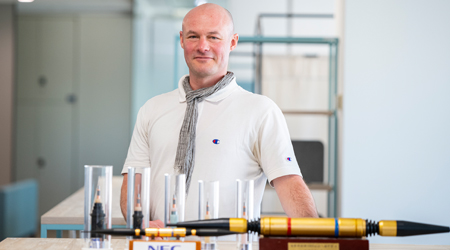Japan
サイト内の現在位置
A deep dive into the career journey of a project manager
Richard Delanglez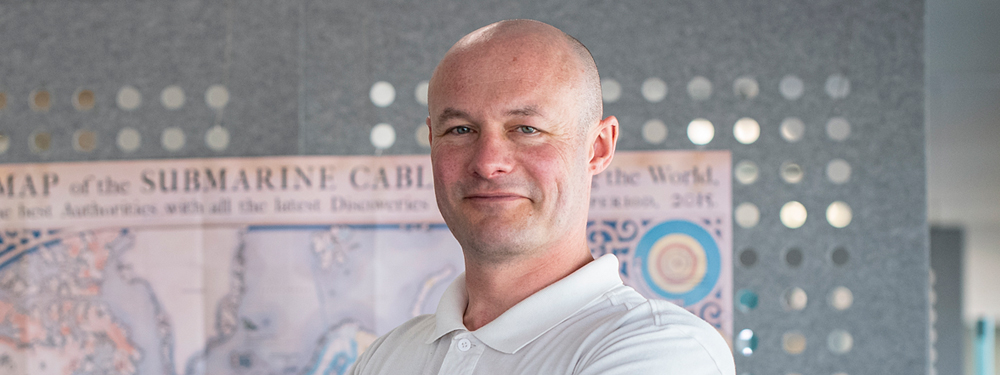

Profile
Richard Delanglez
Project Manager
Submarine Network Division
*The departments, titles, etc. of the people introduced in this report are as of the interview.
The path that led me to NEC
After receiving my master’s degree in telecommunication engineering in France, I interned at Nortel and then worked at Alcatel Answare (now EDS Answare) and Altran before joining NEC France in 2003. At the time, one of France’s leading telecom operators was preparing to launch i-mode—a mobile internet service that had been licensed to the operator by NTT DOCOMO. NEC won the contract to deploy this new service, and I was assigned to serve as a project and implementation leader.
Fast-forwarding to 2011, I found myself presented with an opportunity to go to NEC Corporation for a few years as a transferee from NEC France. Upon arriving in Japan, I began working in Smart Energy business development as an assistant manager. This was around the same time that NEC launched its Smart Energy Division, which was focused on providing battery storage systems to support the energy transition. From there I went on to work in Energy and Smart City/Industrial IoT business development.
I eventually made the decision to stay in Japan for both professional and personal reasons, and have been a member of the Submarine Network Division at NEC Corporation since 2016. During my time with this division, I have been responsible for the tendering process of submarine cable turnkey projects and, as of 2021, project management.
Putting my educational background and experience to work
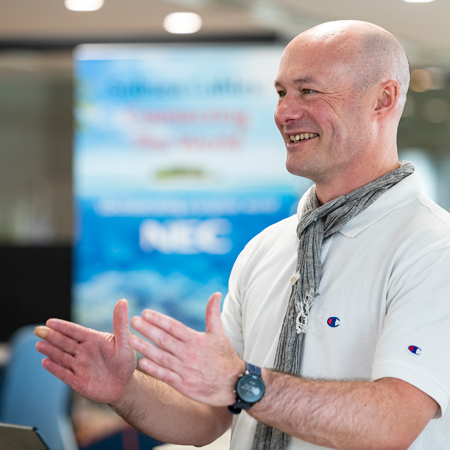
Along the way, my engineering and technical background combined with a solid foundation in physics and mathematics has helped me understand the underlying technologies of NEC’s products and systems. Whether or not we are aware of it, NEC sells technical products, and the difference between us and our competitors can at least be partially attributed to the technical quality we provide. This is why understanding the physics behind our offerings and knowing how to improve implementation is such a big factor in NEC’s success story.
One thing I have learned over the course of my career that has probably helped me the most is how to deal with multiple stakeholders on a project. While I am trained and qualified as a project manager, the training and exams that go into that don’t necessarily help you understand how to best cope with managing upper management, customers, and other stakeholders.
Finding the right person for the right place at the right time
As a project manager, the majority of what I do involves coordinating people. I need to be able to identify the right people at the right time for the project currently at hand, which requires a combination of planning and resources. That may not sound very exciting, but it means that you must understand the capabilities of everyone you will be working with. You also have to ask the right people for advice because there is simply no way you can know everything. This takes a great deal of time, and everything must be coordinated not only within NEC but also between NEC and the customer.
When it comes to team building, my basic philosophy is to explain to potential team members why I would like to bring them on board for a particular project and really listen to what they have to say if they don’t think they’re the right person for the job. This allows me to either find some sort of middle ground with them or move on and look for someone else who will be a better fit. There is no point in forcing someone to do a job they don’t want to do—that’s simply not productive. I try to motivate my team members by explaining to them the importance of what we are doing.
Discovering the draw of working for the Submarine Network Division at NEC
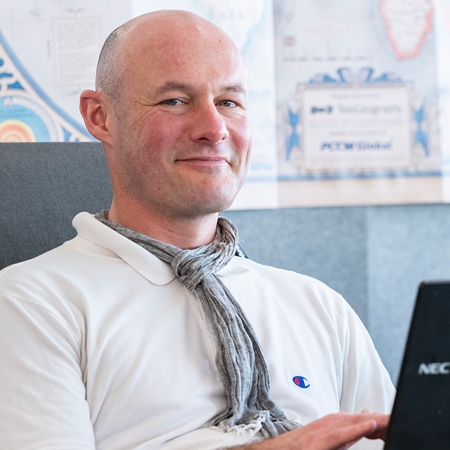
In my work on submarine cable projects, I have found that I learn something new every day as I study how NEC’s technologies are implemented in complex projects. Submarine cable projects can take several years to complete, and there are many different factors involved—including the thousands of kilometers of cable that must be laid on the ocean floor and the high-technology devices at every corner. It’s truly amazing.
My interest in submarine cables is part of what has drawn me to this line of work. Submarine cables are incredibly interesting because they are such a high-performance product. Many of the technologies involved are already being used for terrestrial networks, but the way in which they are utilized in submarine cable systems, which can be upwards of 10,000 kilometers in length and are designed to have a lifespan of 25 years, makes it vital to pay careful attention to details and margins. Submarine cables are also what drive the way we live today. The fact that people can watch videos on their smartphones or stream movies on their TV no matter where they are is all thanks to submarine cables. Without them, the niceties of everyday life would not exist. Communication would still be possible, but it would be really basic.
The other major draw is working in Japan for a company like NEC, which has been a truly gratifying experience. NEC is an established and well-recognized company in Japan, so being part of it provides you with a sense of achievement and respect. At the same time, the company offers many opportunities for internal mobility, making it possible for employees to change jobs quite often and even move from one area to another. The workplace environment is also very supportive, which means you never feel alone. This is part of what makes it such a great company to work for.
Facing day-to-day difficulties and overcoming challenges
As with any company, there are difficulties that I must face in my day-to-day work. One is the sheer amount of work, but that is something all project managers must deal with since it is a position that keeps you very busy. I am well aware of this aspect of my job and have grown accustomed to it. Some of my routine duties include dealing with customers, managing projects, reporting, and being constantly aware of where our stakeholders are at. Right now I am working on a trans-Atlantic cable project with customer contacts in the UK and the United States, and this requires me to participate in meetings held in completely different time zones.
Another difficulty is the vast number of projects and business ventures in which NEC is currently involved. While I would not go so far as to say that we are understaffed, we could certainly use additional resources to support our activities.
The biggest challenge I face in my current position is understanding our marine activities. Submarine cable projects are carried out in two phases. The first is the manufacturing phase, which entails manufacturing the submarine cable system itself, including the cables, repeaters, and other equipment. You then at some point send a cable-laying vessel out to sea to lay the cable and install the repeaters. In this industry it is said that there are two kinds of people—those who have actually spent time on a vessel and those who have not. Those with experience on a vessel of course have a much better understanding of the constraints involved. And since I have never been part of a vessel crew, I am still learning about these constraints.
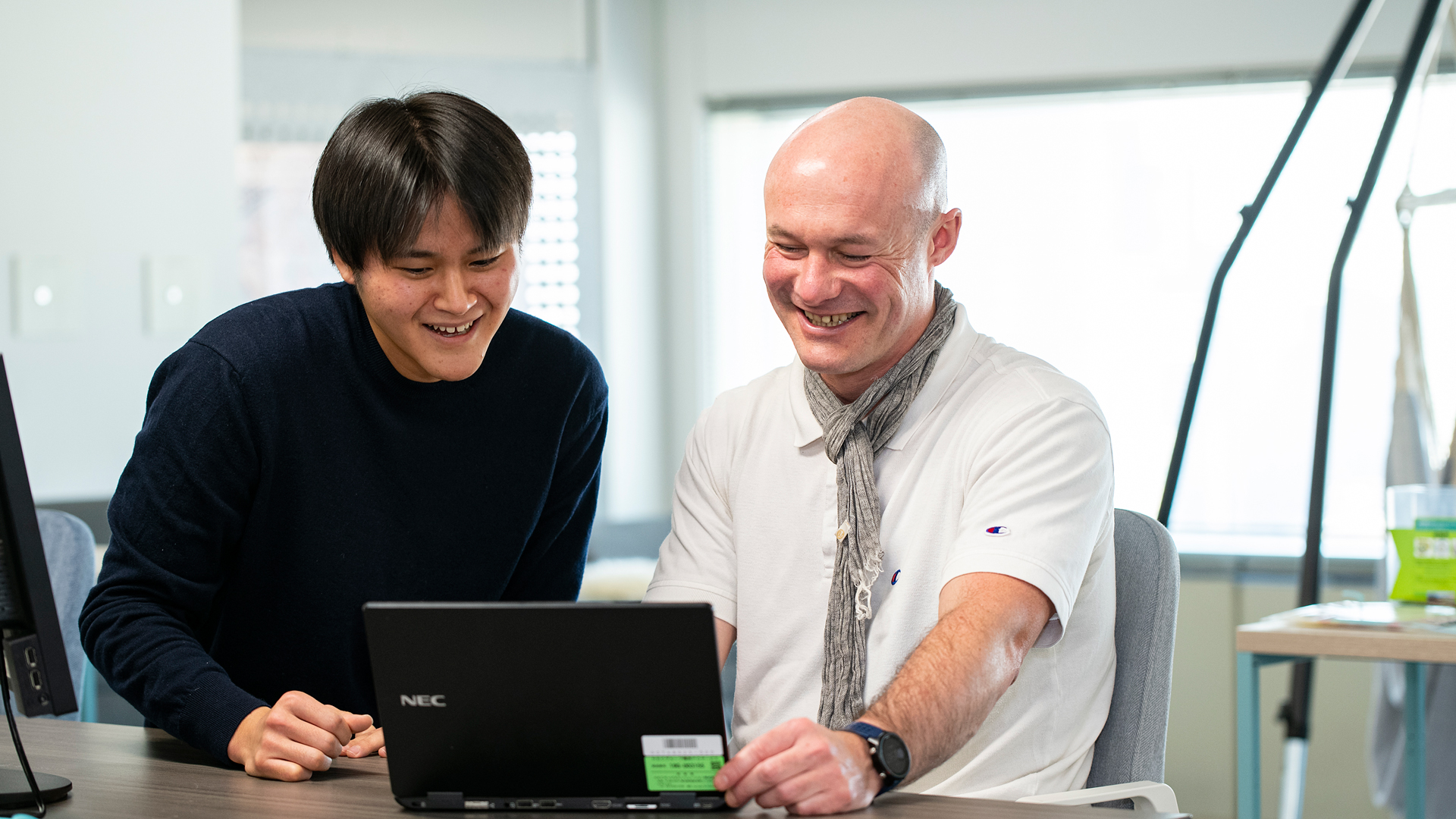
Future aspirations
My aspirations going forward are actually quite practical. As a project manager working on a project that will span several years, my main goal is to ensure that it is completed according to schedule for our customer. This is something I have been striving toward every single day since we first started the project. If I can achieve this goal or at least come close to it, I will consider it a success.
I also want to eventually work on other biddings and projects that will help NEC get ahead in this industry. NEC is one of the world’s top three players in the incredibly competitive submarine cable industry, and contributing to NEC either getting ahead of the competition or maintaining their current position in this race would be something I could be proud of.
Building a career at NEC
If I were to give advice to someone interested in building a career at NEC, it would be to study a specific field and be confident in the background technology knowledge you possess to ensure that you have a solid understanding of what is going on in that field. I would also recommend listening to those around you once you have joined the company because you may find that a Japanese organization like NEC is different than what you are accustomed to. Naturally there will be a period in which you must adapt to your new surroundings. But once you have adapted, you will be able to start contributing to the company and play a more important role.
As for acclimating to life in Japan, it’s honestly not that complicated. Tokyo is a big city, but it’s also extremely convenient. You can live quite close to the city center and it’s still affordable. Everything is also very well organized here. And depending on which country you’re coming from, you may even find that there is a community of fellow expatriates from back home already living here. Since it’s such a big city, you will also have access to entertainment and much, much more. I think you will find that Tokyo is a great place to live and work.
If you are interested in joining NEC but feel hesitant about actually taking the leap because it is so far from home, I would encourage you not to hesitate. The experience and the journey will be an interesting one, and you can always change career paths at some point. Speaking from my own experience, I have no doubt that becoming part of the NEC team will benefit you on both a personal and professional level.
My Favorite CoV
I view the NEC Code of Values as a general guideline showing us how we should behave as members of the NEC Group and what is important to us as a company. It is important for us to identify these values, promote their implementation, and ensure that they are understood by all employees.
CoV: Code of Values. This code of conduct indicates the values and behavior that all members of the NEC Group must demonstrate.
